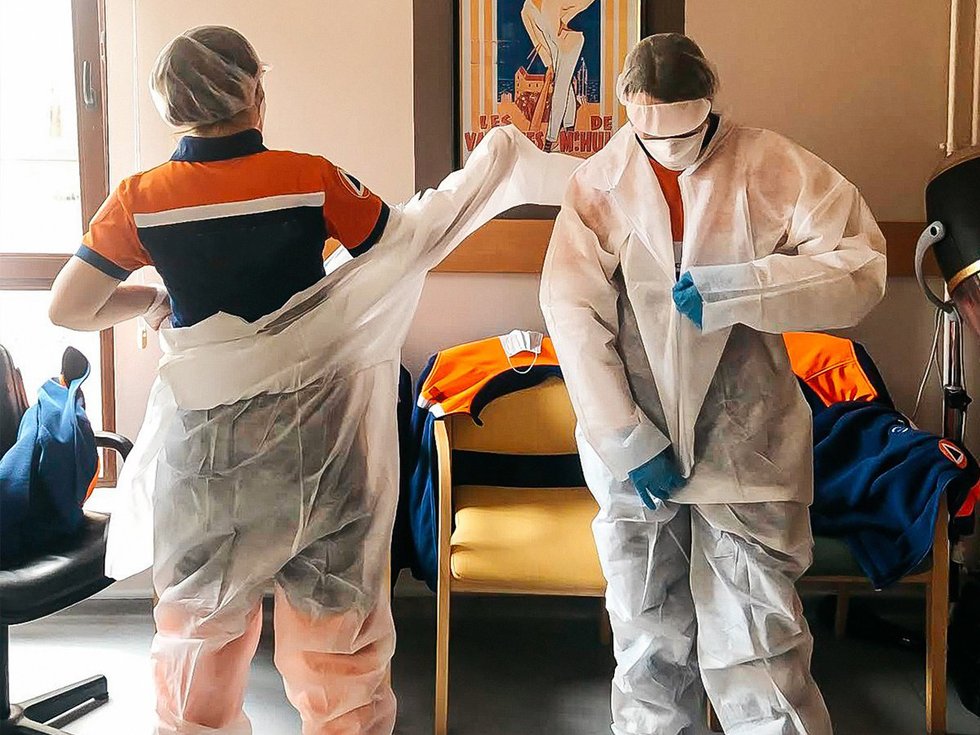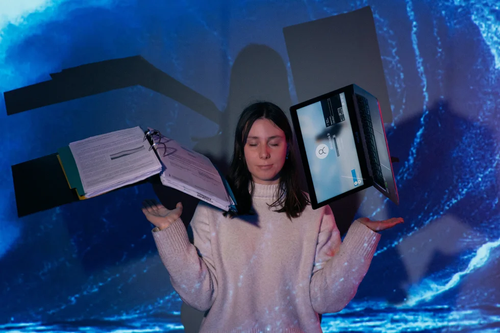How Covid is changing the job of epidemiologists
11. 9. 2020
6 min.


Writer
What do epidemiologists do? A year ago you may have been forgiven for not having heard of this particular job title. But Covid-19 has meant that the study of disease outbreaks has become essential to workers in almost every industry. As more and more people require their expertise to make sense of the pandemic, their work is changing. Dr. Kavita Trivedi, 44, is an epidemiology consultant. Until March her work focused on antibiotic stewardship, which is making sure antibiotics are used appropriately in order to combat antibiotic resistance. Now, most of her time is spent working with companies to help them implement the right policies, keep their employees safe and prevent the spread of infection. Dr. Trivedi explains how her work has changed in the past six months.
How did you become an epidemiology consultant?
I did my undergraduate degree and then I went to medical school, where I became interested in global health. I spent a year in India doing a research project, where I looked at nutritional status across a group of women in a low-income area, and became more interested in that experience.
After medical school, I did three years of an internal medicine residency, and then I ran a homeless clinic in Downtown San Francisco. Then I went to the Centers for Disease Control (CDC) in Atlanta and I did a fellowship, the Epidemic Intelligence Service, during which I learned how to be an epidemiologist. I learned everything from identifying an outbreak all the way through to investigation, how to contain the outbreak, and how to prevent one from happening again.
What kind of work did you do before becoming an epidemiology consultant?
After the CDC, I came back to California where I helped to run the California Department of Public Health Healthcare-Associated Infections Program as a medical epidemiologist for about four years. I helped hospitals with their infection outbreaks as well as with antibiotic stewardship. Then I went into independent consulting and for nearly seven years I have been doing this around both infection control and antibiotic stewardship.
“So many different places need epidemiology consulting right now.”
Of course in the past six months, everything has shifted to infection control. Everybody wants to understand what’s going on with the pandemic. All the questions: how do you open? How do you get people back to work? How do you do it safely so that they feel the organization has their best interests at heart? How do you make sure that facilities are ready? I’ve had to hire more staff, and we’re getting queries from all types of places like schools, biotechnology companies, and courthouses. So many different places need epidemiology consulting right now.
Is this the first time that companies are hiring in-house epidemiologists?
“To be honest, I’m surprised that so many companies are operating without an epidemiologist.”
Yes, I think this role has popped up with the pandemic. There’s so much information coming out on Covid-19 that it’s very hard to make sense of it. Having an epidemiologist translate data and information is extremely useful for a lot of companies. So yes, I think it’s the first time, outside of public health or government institutes, that we’re talking about employing epidemiologists. To be honest, I’m surprised that so many companies are operating without an epidemiologist.
What does your day-to-day look like?
“I’m the expert brought in to talk about Covid.”
I’m still a clinician, so I see patients once a week. Then my day-to-day is conference calls, working on reports, and meeting clients to see exactly what they need. I’ve also been giving lots of presentations to their workforce. I’m the expert brought in to talk about Covid. I gave five webinars last week to about 2,000 people. I also do assessments of different facilities, which I walk through myself with my team.
For the past six months, I’ve been working with the World Health Organisation so I’m up at really odd hours and my days are quite long. Being an independent consultant means I manage my own time, so it’s nice to be flexible.
Has your working day changed since Covid?
“I need to have information at my fingertips and also take the time to talk to a client and understand their needs.”
My day-to-day is similar, but I’m busier since Covid-19, and the work I’m doing seems more urgent. I’ll have a client ask me a question about airborne transmission and by the time I get around to answering 24 hours later, there will be 10 more papers published on the topic. There are 4,000 papers published every week on Covid-19, and so for us to be up-to-date consultants, we have to make sure that we have read the most salient scientific literature. It is a rigorous process. I need to have information at my fingertips and also take the time to talk to a client and understand their needs. For example, if I have a one-hour call with a client, at least two or three hours will be dedicated to making sure that we have the right information beforehand.
What is the difference between an epidemiologist working as a consultant during Covid and one working at a hospital?
Traditionally an epidemiologist is someone who understands and can help control epidemics. But epidemiologists can focus on various aspects of controlling the outbreak. They can be in charge of surveillance, for example, or the control aspect, where they help to develop public health messaging. Lastly, there’s the assessment of what’s happened and how we can prevent this from happening again.
“Epidemiologists are so versatile.”
I think those of us working with the pandemic feel like we have to figure out how to address issues right away. But there are so many other things that epidemiologists are doing, especially in hospitals. They’re tracking trends of other infections that we’re still just as concerned about. There are also all the people focused on the flu and how it’s going to play into the pandemic.
But it’s not just about infection. We’re also talking about chronic disease. We have epidemiologists who focus on occupational health, environmental health, toxic substances, cancer, all of that. Epidemiologists are so versatile. Although many of us are working on Covid, you’ll still find many who are engaged in our regular jobs where we follow trends in infection in other places as well.
Do you create rules and regulations for the businesses you work with?
A business will show me the policy it has in place and I will give them my reflections on how I would improve it or things they should consider. What’s really interesting is that some are more risk-averse than others. Some feel that they need to do some business face to face or they need a workspace for their employees. We help employers make a policy that is consistent with their own beliefs around infection control. It’s likely that if they are bringing us in they’re interested in our opinions so they’ll listen to us.
What have you learned while helping businesses deal with the pandemic?
“A lot of this is implementation science around changing company culture…”
There are a couple of themes. First, how buildings are being prepared in this new normal: ventilation, the use of elevators and shared spaces, how the building is being maintained, cleaned, and disinfected. Second, how employees interact. We’re so used to going into a staff room and all having lunch together. Or having a coffee. How do you still have those interactions in a safe way?
Lastly, there is long-term implementation. How do we wear face coverings for a long period of time? How do we change culture and behavior? A lot of this is implementation science around changing company culture, like an employer saying if you have a cough it’s okay not to come to work, which wasn’t tolerated before. This is a big aspect of what we do.
Do you think the role of epidemiologists in companies is going to become more popular in the coming years?
You get a lot of job satisfaction when you are helping others in a really credible, meaningful way and that’s what epidemiologists do.
I hope that the experience with Covid-19 underscores the importance of including epidemiologists in HR plans and policies to address infection control—both for the safety of employees and the safety of visitors and clients. The pandemic has shown us that people with expertise in the study of infection are needed in a variety of industries to operate safely and confidently.
I hope that younger people who are trying to figure out their careers would look at epidemiology as a viable option. We will need more epidemiologists as we identify more viruses and more bacteria that are able to resist our antibiotics. You get a lot of job satisfaction when you are helping others in a really credible, meaningful way and that’s what epidemiologists do.
Are you optimistic about the future?
I’m hopeful. The clients I have worked with are very open to figuring out how to change worker culture so that we are able to keep one another safe. In some communities, particularly in Asia, there is this culture of doing something that makes others safer and more comfortable. In the US and Europe, we have to change a little bit to a more community-based approach. I’m hopeful that we will get this under control and then, of course, vaccines will come into play. If we can do that, we have a good chance of getting back to work, getting our economies back to work but also being prepared for the next pandemic.
Photo: Welcome to the Jungle
Follow Welcome to the Jungle on Facebook, LinkedIn, and Instagram, and subscribe to our newsletter to get our latest articles every day!

Viac inšpirácie: Odvetvia a povolania

The good, the bad, and the ugly behind seasonal work
Seasonal work can allow you to travel the world, learn new skills and meet new people, but is it all sunshine and roses?
17. 7. 2024

What about the jobs ChatGPT could create?
While warnings of a labor apocalypse grow louder, some experts believe AI will increase demand for human workers
20. 2. 2023

What if college isn’t the only route to success
As the US suffers from a shortage of plumbers and electricians, becoming a tradesperson can be very lucrative. So why do so few Americans consider it?
11. 1. 2023

5 big data careers that just keep growing
“Big data” is currently one of the most sought-after areas of tech expertise. But what are the different roles you could take?
27. 4. 2022

Product owner vs product manager – What’s the difference?
Product managers and product owners are multidisciplinary roles that create new products and improve ones that already exist... Huh?
17. 3. 2022
Novinky, ktoré to vyriešia
Chcete držať krok s najnovšími článkami? Dvakrát týždenne môžete do svojej poštovej schránky dostávať zaujímavé príbehy, ponuky na práce a ďalšie tipy.

Hľadáte svoju ďalšiu pracovnú príležitosť?
Viac ako 200 000 kandidátov našlo prácu s Welcome to the Jungle
Preskúmať pracovné miesta